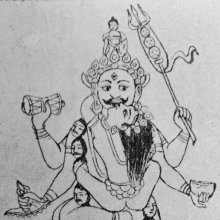Ajaya: 20 definitions
Introduction:
Ajaya means something in Buddhism, Pali, Hinduism, Sanskrit, Jainism, Prakrit. If you want to know the exact meaning, history, etymology or English translation of this term then check out the descriptions on this page. Add your comment or reference to a book if you want to contribute to this summary article.
Images (photo gallery)
In Hinduism
Vaishnavism (Vaishava dharma)
Source: humindian: 108 names of Lord KrishnaOne of the 108 names of Krishna; Meaning: "The Conqueror Of Life And Death"

Vaishnava (वैष्णव, vaiṣṇava) or vaishnavism (vaiṣṇavism) represents a tradition of Hinduism worshipping Vishnu as the supreme Lord. Similar to the Shaktism and Shaivism traditions, Vaishnavism also developed as an individual movement, famous for its exposition of the dashavatara (‘ten avatars of Vishnu’).
Purana and Itihasa (epic history)
Source: Cologne Digital Sanskrit Dictionaries: The Purana IndexAjaya (अजय).—The son of Darbhaka and father of Nandivardhana.*
- * Bhāgavata-purāṇa XII. 1. 6, 7.

The Purana (पुराण, purāṇas) refers to Sanskrit literature preserving ancient India’s vast cultural history, including historical legends, religious ceremonies, various arts and sciences. The eighteen mahapuranas total over 400,000 shlokas (metrical couplets) and date to at least several centuries BCE.
Shaktism (Shakta philosophy)
Source: Google Books: Manthanabhairavatantram1) Ajaya (अजय) refers to one of the eight Servants (ceṭa-aṣṭaka) associated with Kāmākhya (corresponding to the eastern face of Bhairava), according to the Manthānabhairavatantra, a vast sprawling work that belongs to a corpus of Tantric texts concerned with the worship of the goddess Kubjikā.—[...] The eight Servants (ceṭāṣṭaka): Śaṃkhapāla, Kaṃkāla, Viśālaka, Ajaya, Vijaya, Vīrabhadra, Raktākṣa, Kasmāla.
2) Ajayā (अजया) is the name of the Yakṣiṇī associated with Nāda, one the eight Sacred Seats (pīṭha), according to the Yogakhaṇḍa (chapter 14) of the Manthānabhairavatantra.
Source: Brill: Śaivism and the Tantric Traditions (shaktism)Ajaya (अजय) [=Ajayya?] refers to “invincible”, according to Sāhib Kaul’s Śārikāstrotra.—Accordingly, “[...] He who recites your next syllable, which is īśa with abja and the one above the left ear, his enemy, although invincible (ajayya) even for all the gods, will instantly, in the wink of an eye, become a guest in the house of Death. He who remembers your next syllable, which is īśa together with vaktravṛtta and vahni, will have at his disposal ‘enjoyment’ (bhukti), liberation, the method of real vicāra, and devotion. [...]”.

Shakta (शाक्त, śākta) or Shaktism (śāktism) represents a tradition of Hinduism where the Goddess (Devi) is revered and worshipped. Shakta literature includes a range of scriptures, including various Agamas and Tantras, although its roots may be traced back to the Vedas.
In Buddhism
Tibetan Buddhism (Vajrayana or tantric Buddhism)
Source: archive.org: The Indian Buddhist IconographyAjayā (अजया) is one of the twenty-four Goddesses surrounding Buddhakapāla in the buddhakapālamaṇḍala, according to the 5th-century Sādhanamālā (a collection of sādhana texts that contain detailed instructions for rituals).—Buddhakapāla refers to one of the various emanations of Akṣobhya and the sādhana says that when Heruka is embraced by Citrasenā he gets the name of Buddhakapāla.—Ajayā stands in the north of the outermost circle. She has a blue colour two arms, one face, ornaments of bones, brown hair rising upwards but no garlands of heads. She carries the kapāla in the left and the kartri in the right, and dances in the ardhaparyaṅka attitude.

Tibetan Buddhism includes schools such as Nyingma, Kadampa, Kagyu and Gelug. Their primary canon of literature is divided in two broad categories: The Kangyur, which consists of Buddha’s words, and the Tengyur, which includes commentaries from various sources. Esotericism and tantra techniques (vajrayāna) are collected indepently.
In Jainism
General definition (in Jainism)
Source: HereNow4u: Lord Śrī MahāvīraAjaya (अजय) is the name of a river flowing between the northern and southern divisions of Rāḍha: a village visited by Mahāvīra during his fifth year of spiritual-exertion.—After Kalambukā, he decided to go to Lāḍha (Rāḍha) country, considered as Anārya where no monk or ascetic would even imagine going. There were two divisions of Lāḍha country north and south, or Vajra and Śubhra. The river Ajaya used to flow in between. In Lāḍha country, there were no suitable places to stay for the Lord. Even tasteless, minimal food used to come about with great difficulty.

Jainism is an Indian religion of Dharma whose doctrine revolves around harmlessness (ahimsa) towards every living being. The two major branches (Digambara and Svetambara) of Jainism stimulate self-control (or, shramana, ‘self-reliance’) and spiritual development through a path of peace for the soul to progess to the ultimate goal.
Languages of India and abroad
Sanskrit dictionary
Source: DDSA: The practical Sanskrit-English dictionaryAjaya (अजय).—a. [nāsti parairjayo yasya] Invincible, unsurpassed unconquerable.
-yaḥ [na. ta.] A defeat; सुखदु (sukhadu):खे समे कृत्वा लाभालाभौ जयाजयौ (khe same kṛtvā lābhālābhau jayājayau) Bhagavadgītā (Bombay) 2.38.
2) Name of Agni (ajena chāgena yāti; yā-ka); or of Viṣṇu (according to some); of a lexicographer.
-yā [nāsti jayo mādakatvena asyām]
1) Hemp or भाङ्ग (bhāṅga).
2) Name of a friend of Durgā
3) Māyā or illusion.
Source: Cologne Digital Sanskrit Dictionaries: Edgerton Buddhist Hybrid Sanskrit DictionaryAjayā (अजया).—name of a goddess: Sādhanamālā 502.10.
Source: Cologne Digital Sanskrit Dictionaries: Shabda-Sagara Sanskrit-English DictionaryAjaya (अजय).—m.
(-yaḥ) Defeat. mfn.
(-yaḥ-yā-yaṃ) Unsurpassed, unsubdued, over whom or which no triumph is obtained. f.
(-yā) Hemp. E. a neg. jaya victory.
--- OR ---
Ajaya (अजय) or Ajayya.—mfn.
(-yaḥ-yā-yaṃ) Invincible, not to be subdued or surpassed. E. a neg. jaya conquerable.
Source: Cologne Digital Sanskrit Dictionaries: Benfey Sanskrit-English DictionaryAjaya (अजय).—m. defeat, [Bhagavadgītā, (ed. Schlegel.)] 2, 38. Kakubjaya, i. e.
Ajaya is a Sanskrit compound consisting of the terms a and jaya (जय).
Source: Cologne Digital Sanskrit Dictionaries: Aufrecht Catalogus CatalogorumAjaya (अजय) as mentioned in Aufrecht’s Catalogus Catalogorum:—Abridged from Ajayapāla. Oxf. 182^b. 195^b.
Source: Cologne Digital Sanskrit Dictionaries: Monier-Williams Sanskrit-English Dictionary1) Ajaya (अजय):—[=a-jaya] m. non-victory, defeat
2) [v.s. ...] mfn. unconquered, unsurpassed, invincible
3) [v.s. ...] m. Name of Viṣṇu
4) [v.s. ...] of a lexicographer
5) [v.s. ...] of a river
6) Ajayā (अजया):—[=a-jayā] [from a-jaya] f. hemp
7) [v.s. ...] Name of a friend of Durgā
8) [v.s. ...] Māyā or Illusion.
Source: Cologne Digital Sanskrit Dictionaries: Goldstücker Sanskrit-English DictionaryAjaya (अजय):—I. [tatpurusha compound] m.
(-yaḥ) Defeat. E. a neg. and jaya. Ii. [bahuvrihi compound] 1. m. f. n.
(-yaḥ-yā-yam) Unsurpassed, unsubdued, over whom or which no triumph is obtained. 2. m.
(-yaḥ) 1) A name of Viṣṇu.
2) The proper name of a lexicographer.
3) The name of a river in Rāḍha. 3. f.
(-yā) 1) Hemp.
2) One of the female friends of Durgā. See vijayā. E. a priv. and jaya.
Source: Cologne Digital Sanskrit Dictionaries: Yates Sanskrit-English Dictionary1) Ajaya (अजय):—[a-jaya] (yaḥ) 1. m. Defeat; (yā) 1. f. hemp. a. Invincible; unsurpassed.
2) Ajayā (अजया):—(yā) 1. f. Illusion.
Source: DDSA: Paia-sadda-mahannavo; a comprehensive Prakrit Hindi dictionary (S)Ajaya (अजय) in the Sanskrit language is related to the Prakrit words: Ajaya, Ajea.
[Sanskrit to German]
Sanskrit, also spelled संस्कृतम् (saṃskṛtam), is an ancient language of India commonly seen as the grandmother of the Indo-European language family (even English!). Closely allied with Prakrit and Pali, Sanskrit is more exhaustive in both grammar and terms and has the most extensive collection of literature in the world, greatly surpassing its sister-languages Greek and Latin.
Prakrit-English dictionary
Source: DDSA: Paia-sadda-mahannavo; a comprehensive Prakrit Hindi dictionary1) Ajaya (अजय) in the Prakrit language is related to the Sanskrit word: Ayata.
2) Ajaya (अजय) also relates to the Sanskrit word: Ajaya.
3) Ajāya (अजाय) also relates to the Sanskrit word: Ajāta.
Prakrit is an ancient language closely associated with both Pali and Sanskrit. Jain literature is often composed in this language or sub-dialects, such as the Agamas and their commentaries which are written in Ardhamagadhi and Maharashtri Prakrit. The earliest extant texts can be dated to as early as the 4th century BCE although core portions might be older.
Kannada-English dictionary
Source: Alar: Kannada-English corpusAjaya (ಅಜಯ):—[adjective] defeated; failed.
--- OR ---
Ajaya (ಅಜಯ):—
1) [noun] non-victory; defeat.
2) [noun] an invincible, unsurpassed man.
3) [noun] Viṣṇu.
Kannada is a Dravidian language (as opposed to the Indo-European language family) mainly spoken in the southwestern region of India.
Nepali dictionary
Source: unoes: Nepali-English DictionaryAjaya (अजय):—adj. invincible; unconquerable; n. defeat;
Nepali is the primary language of the Nepalese people counting almost 20 million native speakers. The country of Nepal is situated in the Himalaya mountain range to the north of India.
See also (Relevant definitions)
Starts with: Ajaya-phal, Ajayaba, Ajayabaghara, Ajayadeva, Ajayagarha, Ajayamana, Ajayana, Ajayapala, Ajayapala caulukya, Ajayasiha, Ajayasimha, Ajayavarman.
Ends with (+58): Acaryajaya, Akshaparajaya, Ananvavajaya, Apajaya, Aparajaya, Arajaya, Asanajaya, Atirajaya, Atmajaya, Avajaya, Bajaya, Bhadrajaya, Bhujagarajaya, Bhumikajaya, Bhutajaya, Brahmajaya, Ccajaya-ccajaya, Cittajaya, Devajaya, Dhanaparajaya.
Full-text (+32): Ajayapala, Ajayya, Ajayasimha, Ajayavarman, Ajata, Ajea, Ajathya, Ajayagarha, Vagya, Ayata, Sthiradamshtra, Valguka, Avajaya, Jayajayam, Darbhaka, Ajaya-phal, Nandivardhana, Ramagitagovinda, Kankala, Vishalaka.
Relevant text
Search found 17 books and stories containing Ajaya, Ajayā, A-jaya, A-jayā, Ajāya; (plurals include: Ajayas, Ajayās, jayas, jayās, Ajāyas). You can also click to the full overview containing English textual excerpts. Below are direct links for the most relevant articles:
Rig Veda (translation and commentary) (by H. H. Wilson)
Garga Samhita (English) (by Danavir Goswami)
Verse 5.8.18 < [Chapter 8 - The Killing of Kaṃsa]
Verse 2.9.47 < [Chapter 9 - Brahmā’s Prayers]
Chaitanya Bhagavata (by Bhumipati Dāsa)
Verse 3.4.333 < [Chapter 4 - Descriptions of Śrī Acyutānanda’s Pastimes and the Worship of Śrī Mādhavendra]
Verse 3.3.262 < [Chapter 3 - Mahāprabhu’s Deliverance of Sarvabhauma, Exhibition of His Six-armed Form, and Journey to Bengal]
Verse 2.10.312 < [Chapter 10 - Conclusion of the Lord’s Mahā-prakāśa Pastimes]
The Indian Buddhist Iconography (by Benoytosh Bhattachacharyya)
Kamashastra Discourse (Life in Ancient India) (by Nidheesh Kannan B.)
3. Works on Kāmasāhitya (a): Kuṭṭanīmata < [Chapter 2 - An Appraisal of Kāmaśāstra Works in Sanskrit]
Vedic influence on the Sun-worship in the Puranas (by Goswami Mitali)
Part 3 - Sūrya, the Creator, the Preserver and the Destroyer < [Chapter 4 - Vedic Influence on the Sun-Worship in the Purāṇas]

